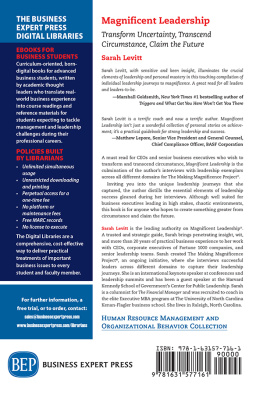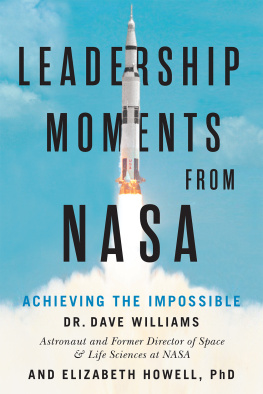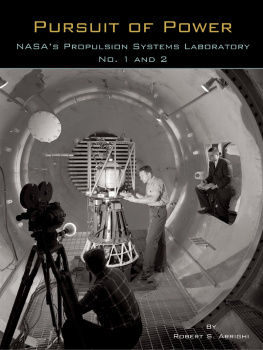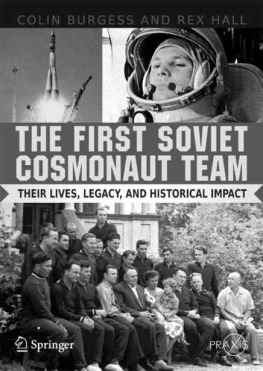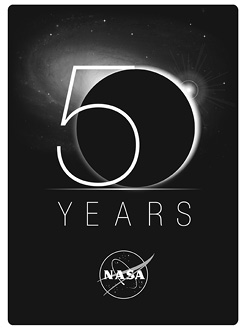NASA at 50: interviews with NASA senior leadership / Rebecca Wright, Sandra Johnson, Steven J. Dick, editors.
p. cm.
1. Aerospace engineersUnited StatesInterviews. 2. United States. National Aeronautics and Space AdministrationHistorySources. I. Wright, Rebecca II. Johnson, Sandra L. III. Dick, Steven J. IV. Title: NASA at fifty.
Introduction
The 50th anniversary of NASA on 1 October 2008 found an agency in the midst of deep transition. In the closing year of the presidency of George W. Bush, only a month before the presidential election and in the midst of a worldwide economic crisis, the Agency was implementing a new Vision for Space Exploration intended to return humans to the Moon, to proceed onward to Mars, and to study the cosmos beyond.
All of this was to be done not with new funding, but by ramping down the Space Shuttle Program that had been the centerpiece of human spaceflight for three decades and ramping up a new program known collectively as Constellation. The immediate elements of Constellation were a new launch vehicle, Ares I; an Apollo on steroids human capsule dubbed Orion; and the lunar lander Altair. Huge decisions were being made that would likely affect the Agency for decades to come. In short, a new era of spaceflight was dawningor at least that was NASAs fondest hope.
It was in this milieu that the History Division at NASA Headquarters commissioned oral history interviews to be undertaken with NASA senior management. This volume is the result and provides a snapshot of the thinking of NASA senior leadership on the occasion of its 50th anniversary and in the midst of these sea changes. It is all the more valuable from an historical point of view because of the large changes that have again taken place since the 50th anniversary. Since the interviews could not be done instantaneously, this volume is the result of conversations recorded during 2007 and 2008. The interviews were facilitated by Rebecca Wright and Sandra Johnson of the Johnson Space Center (JSC) in Houston, and the whole program was under my guidance as the NASA Chief Historian at Headquarters in Washington, DC. Recordings and transcripts are available at JSC and Headquarters and are now part of the Agencys considerable oral history efforts of the past several decades.
The reader of this volume may also wish to consult a companion volume in the NASA History series, NASAs First 50 Years: Historical Perspectives, the proceedings of NASAs 50th anniversary conference. There the reader will find in-depth critical analysis from a variety of scholars of the diverse array of NASAs activities from 1958 to the present.
Steven J. Dick
NASA Chief Historian
December 2009
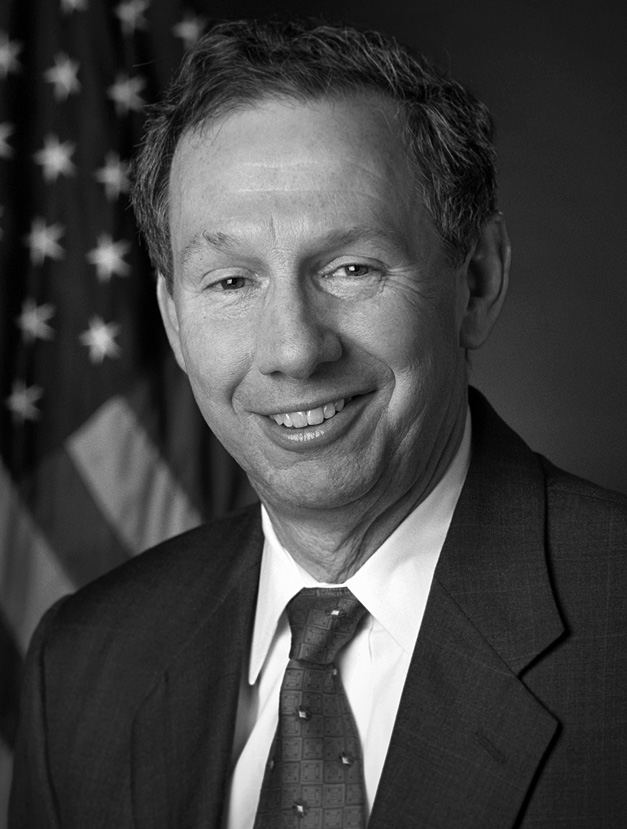
Chapter 1
Michael D. Griffin
Administrator
Mike Griffin became the National Aeronautics and Space Administration (NASA) Administrator on 14 April 2005, a position he had been aiming for his entire life. Griffins interest in space first began when his mother gave him A Childs Book of Stars when he was five years old. He was so fascinated by the books scientific material that he became enamored with space and did not want to do anything else. The interest continued, and a few years later, when Sputnik launched, Griffin remembers being the only student in his third-grade class who knew what it was and why it was important; he explained it all to his teacher. By the time he became a teenager, Griffin had realized that he saw the bigger picture, saw how things connected and related, and began to feel like a leadership position was something that he could aspire to, so he used that goal to shape his career.
Although he has described himself modestly as a simple aerospace engineer from a small town, Griffin was not. He served in a number of high-profile jobs with various prominent companies, organizations, and universities. When asked to become the NASA Administrator, he was 55 and serving as head of the Space Department at Johns Hopkins University Applied Physics Laboratory.
This interview, conducted on 10 September 2007 at NASA Headquarters, began with Griffin talking about his reasons for assuming this leadership role that he held from April 2005 until January 2009. Nearby was a framed display containing the book that inspired his lifes dream.
I would not have just accepted the position of NASA Administrator merely because it was offered. I was at a prestigious university laboratory in a very comfortable situation and enjoyed it quite a lot. If NASA had been following the plan that the Agency was following prior to the loss of Columbia [STS-107] and President George W. Bushs announcement of the Vision for Space Exploration, I honestly dont think I would have been interested. Taking this job is a substantial financial sacrifice and an enormous personal sacrifice. I see my family way less often than I want, and I pursue my hobbies with less vigor than I used to. You give up a lot to accept a senior position in public service.
But I think and have thought for decades that the proper purpose of the United States civil space program is pretty much along the lines that President Bush announced in January of 2004. The President got it right, and given a chance to help bring that about, I would take the position of Administrator, and I did take it. Thats the more general reason, but the very specific reason was that this was a place I wanted to be at this time and for that purpose.
What has been the most challenging aspect that youve encountered since moving into this role?
Overcoming the loss of credibility that NASA encountered, frankly, following the Challenger [STS-51L] accident and throughout the Space Station era and then into the loss of Columbia. As you well know, the commission that investigated the loss of Columbia found disturbing similarities with regard to the management decision-making process that cost us Challenger. And the development of the International Space Station and, as an agency, our inability to control cost and schedule and all that has not been our finest hour. NASAs credibility was, I would say, at an all-time low when I took over the Agency.
I have way more external advice than I need or want, most of which has to be paid significant attention. I have way more scrutiny by the OMB [Office of Management and Budget] than any prior Administrator. I have relatively junior staff exercising significant control over both budget and direction at NASA, because NASA is not trusted any longer in the upper reaches of the federal government. I have way more scrutiny from congressional staff than has ever been the practice in the past. With our most recent authorization bill, we owe the Congress something like 55 or so reports in any given year on various aspects of what were doing.
We have organizations like the Government Accountability Office investigating our decisions on launch architecture. When I was young, NASAs word on what the launch architecture needed to be was the word. Others were not judged to have the appropriate credentials to be asking those questions, and yet now they are.


